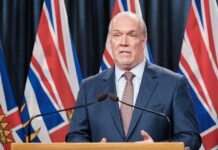The provincial fiscal outlook is for continued and stable economic growth

Photo: Vinnie Combow
CAROLE James, Minister of Finance, has released Public Accounts 2017-18, confirming a budget surplus and taking steps to address a past audit qualification on BC Hydro’s regulatory deferral accounts.
“Our government has been working hard throughout our first year in office to clean up the problems we inherited, while delivering on our commitment to make life better for people,” James said on Tuesday. “Despite historic losses at ICBC and a $950-million adjustment to address the Auditor General’s concerns about the former government’s approach to rate regulation, we reduced our debt and achieved a truly balanced budget.”
The audited financial statements show an operating surplus of $301 million, which is $55 million higher than the surplus forecast in the Budget 2017 Update. Revenue was $571 million higher than the previous year. This was mostly due to increased federal transfers resulting from revised population estimates and higher taxation revenue related to strong economic growth over the year.
Government increased spending on the programs and services people rely on by almost $3 billion, compared to the previous year, with new investments in health care, education, housing and social services, and significant spending in B.C.’s natural resource sector, in response to the 2017 wildfire season. This year also shows a $918 million net decrease in overall provincial debt, compared to March 31, 2017.
The most substantial change versus projections in the 2017 Budget Update is a decrease of $1.9 billion in the combined operating results of commercial Crown corporations. This drop was primarily due to the record loss of $1.3 billion at ICBC last fiscal year, as well as a $950 million adjustment to respond to an audit recommendation relating to BC Hydro’s use of regulatory accounts within the 2016-17 Public Accounts.
The provincial fiscal outlook is for continued and stable economic growth. Preliminary data shows B.C.’s real gross domestic product grew by an estimated 3.9% in 2017 – the second highest among provinces, and private sector economic forecasters expect B.C. to be among the top provincial economic performers over the fiscal plan.
At 15.6%, British Columbia continues to have one of the lowest taxpayer-supported debt-to-GDP ratios in the country – the lowest it has been in four years – as well as a sustainable taxpayer-supported debt-to-revenue ratio of 82.5%.











